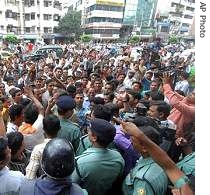2007年VOA标准英语-Bangladesh's Political Parties Reopen Offices A(在线收听)
New Delhi
11 September 2007
In Bangladesh, political parties have reopened their offices after the government eased a ban on political activity in the country. As Anjana Pasricha reports from New Delhi, Bangladesh has been under emergency rule since January, and much of its senior political leadership is in jail facing charges of corruption.

Bangladesh Nationalist Party activists gather before central office in Dhaka, Bangladesh, 10 Sep 2007
It was celebration time for Bangladesh's beleaguered political parties as they reopened offices in Dhaka that had been closed for the past eight months.
The army-backed interim government has allowed political parties to hold indoor meetings for the first time since it banned all political activity after taking charge in January. Public meetings or rallies remain banned.
Political parties have welcomed the move. They will begin talks about reform with the Election Commission on Wednesday.
Dhaka University professor, Ataur Rahman, says the government wants political parties to search for new leadership and put an end to their hostility that pushed the country to the brink of chaos.
"The government is also assessing how the political parties really behave. Most of the leaders are arrested, so I think it is very important to see how the political parties align and realign among themselves," said Rahman. "I think government is also very carefully examining how the new leadership is coming in the political parties, and also whether political parties have also developed a degree of tolerance."
In its bid to clean up the country's notoriously corrupt politics, the government has already arrested about 170 people, including the country's two most powerful political figures, Sheikh Hasina of the Awami League party and Khaleda Zia of the Bangladesh Nationalist Party.
But the political vacuum in recent months had led to unease. Questions were raised about the government's intentions of restoring democracy. University students led violent protests last month demanding an end to emergency rule.
In a televised address on Sunday, the chief of the interim government, Fakhruddin Ahmed, reiterated promises to hold elections late next year.
But he said the administration wants to establish a lasting democracy by removing the influence of money and muscle. Analysts say the partial resumption of politics will ease tensions and help reassure people that the government will keep that promise.